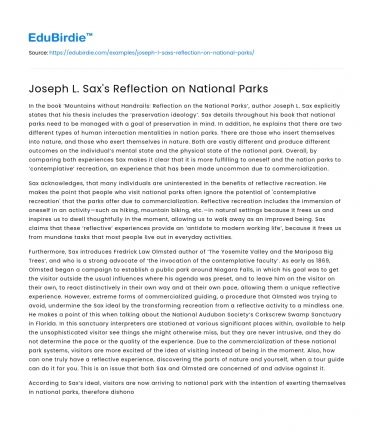In the book ‘Mountains without Handrails: Reflection on the National Parks’, author Joseph L. Sax explicitly states that his thesis includes the ‘preservation ideology’. Sax details throughout his book that national parks need to be managed with a goal of preservation in mind. In addition, he explains that there are two different types of human interaction mentalities in nation parks. There are those who insert themselves into nature, and those who exert themselves in nature. Both are vastly different and produce different outcomes on the individual’s mental state and the physical state of the national park. Overall, by comparing both experiences Sax makes it clear that it is more fulfilling to oneself and the nation parks to ‘contemplative’ recreation, an experience that has been made uncommon due to commercialization.
Sax acknowledges, that many individuals are uninterested in the benefits of reflective recreation. He makes the point that people who visit national parks often ignore the potential of 'contemplative recreation' that the parks offer due to commercialization. Reflective recreation includes the immersion of oneself in an activity—such as hiking, mountain biking, etc.—in natural settings because it frees us and inspires us to dwell thoughtfully in the moment, allowing us to walk away as an improved being. Sax claims that these ‘reflective’ experiences provide an ‘antidote to modern working life’, because it frees us from mundane tasks that most people live out in everyday activities.
Save your time!
We can take care of your essay
- Proper editing and formatting
- Free revision, title page, and bibliography
- Flexible prices and money-back guarantee
Furthermore, Sax introduces Fredrick Law Olmsted author of ‘The Yosemite Valley and the Mariposa Big Trees’, and who is a strong advocate of ‘the invocation of the contemplative faculty’. As early as 1869, Olmsted began a campaign to establish a public park around Niagara Falls, in which his goal was to get the visitor outside the usual influences where his agenda was preset, and to leave him on the visitor on their own, to react distinctively in their own way and at their own pace, allowing them a unique reflective experience. However, extreme forms of commercialized guiding, a procedure that Olmsted was trying to avoid, undermine the Sax ideal by the transforming recreation from a reflective activity to a mindless one. He makes a point of this when talking about the National Audubon Society’s Corkscrew Swamp Sanctuary in Florida. In this sanctuary interpreters are stationed at various significant places within, available to help the unsophisticated visitor see things she might otherwise miss, but they are never intrusive, and they do not determine the pace or the quality of the experience. Due to the commercialization of these national park systems, visitors are more excited of the idea of visiting instead of being in the moment. Also, how can one truly have a reflective experience, discovering the parts of nature and yourself, when a tour guide can do it for you. This is an issue that both Sax and Olmsted are concerned of and advise against it.
According to Sax’s ideal, visitors are now arriving to national park with the intention of exerting themselves in national parks, therefore dishonoring the luxury of reflective experience. People are bringing in the goal driven, competitive attitudes from society, therefore taking away from other visitors. At the same time, Sax claims that there is a quality books of drive and competition, of a will to achievement, self-testing, and supremacy. However, he repeatedly makes the distinction and states that this is particularly important to those who understand the land, and have experienced it. This is different for visitors who are attracted by the chummy resorts, and not the activity itself. They are particularly amateur at the activity, and instead of being in the moment, focus on the end prize at the end of the activity, which defeats the purpose. Sax argues that the pinnacle of these monumental national parks is not reaching the summit, but the climb itself. Sax’s concern is still prevalent today and is quite evident from the use of social media. Everyone wants to get the best picture of their hike, or ski trip, to give off this nature junkie persona. The rise of deaths from people taking selfies, instead of being aware of their surroundings in national parks is horrifying. The national park system has released that on average six people die taking selfies a week. Are these pictures really worth dying for? At national parks, there is overcrowding in the monumental areas of people trying to take pictures. Perhaps if Sax wrote this book today, it wouldn’t be mountains without handrails, it would be nature without cellphones.
The commercialization in national parks through the establishment of roads, RV campsites, snowmobiles, hotels, gift shops, and many more, people are not experiencing the wilderness the way Sax advises we should, through an autotelic perspective. We should use Sax’s idea of subjective experience of reflective recreation and make it a universal principle about how we should interact with nature. Afterall we are a part of nature, even in the most commercialized forms of wilderness. So, losing the remnant of our needed relationship with the wilderness, perhaps means that we are also losing the remnants of ourselves.






 Stuck on your essay?
Stuck on your essay?

